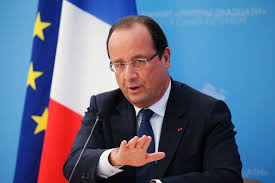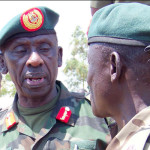
France is committed to “destroying” the so-called Islamic State group after Friday’s deadly attacks, President Francois Hollande has said.
He said he would table a bill to extend the state of emergency declared after the attacks for three months and would suggest changes to the constitution.
France’s military campaign against IS in Iraq and Syria will also intensify.
IS says it carried out the attacks on bars, restaurants, a concert hall and a stadium in which 129 people died.
Speaking during a joint session of both houses of parliament, Mr Hollande said the constitution needed to be amended as “we need an appropriate tool we can use without having to resort to the state of emergency”.
Other measures he said would be pursued included:

- 5,000 extra police posts in the next two years and no new cuts in the defence budget
- Making it easier to strip dual nationals of their French citizenship if they are convicted of a terrorist offence, as long as this did not render them stateless
- Speeding up the deportation of foreigners who pose “a particularly grave threat to the security of the nation”
- Pushing for greater European action against arms trafficking and greater penalties for it in France
Mr Hollande said he would travel to meet US President Barack Obama and Russian Vladimir Putin in the coming days to discuss action against the group.
He reiterated his opposition to Syrian President Bashar al-Assad remaining in power but said “our enemy in Syria is Daesh [IS]”.
He promised more resources for the security forces and said the Charles de Gaulle aircraft carrier would be sent on Thursday to bolster the military campaign against IS.

Analysis: Hugh Schofield, BBC News, Paris
This was a solemn speech in which one felt the president genuinely striving – under the weight of appalling circumstance – to give service to the nation.
He knows that the people expect a riposte. He said it would come in two forms: military and judicial.
In Syria there will intensified strikes, and new co-ordination with the US and Russia.
In France there will be a three-month extension of the state of emergency; more police and magistrates; possible powers to strip dual nationals of French citizenship.
There will also be a reform of the constitution – creating a new status short of all-out war in which exceptional powers can be handed to police.
But President Hollande is better at empathy than at talking tough. His opponents will give him slack because today no-one wants to expose dissent.
But are these measures really going to be enough? Or are they just more administrative knob-twiddling, when the people feel in deadly peril?
In the early hours of Monday, a total of 23 people were arrested, 104 put under house arrest, and dozens of weapons seized in more than 168 raids on suspected Islamist militants across France.
Belgian police say two people arrested on Saturday have been charged with “participating in a terrorist attack”.
They were among seven people detained in Belgium at the weekend.
Five of them were later released, including Mohammed Abdeslam, the brother of two suspects – Brahim Abdeslam, killed during the attacks, and Salah Abdeslam, who is on the run.
Suspected Paris attackers
- Salah Abdeslam, 26 – urgently sought by police
- Brahim Abdeslam, 31 – named as attacker who died near Bataclan concert hall
- Omar Ismail Mostefai, 29, from near Paris – died in attack on Bataclan
- Bilal Hadfi, 20 – named as attacker who died at Stade de France
- Ahmad al-Mohammad, 25, from Idlib, Syria – died at Stade de France (unverified)
- Samy Amimour, 28, from near Paris – suicide bomber at Bataclan
- Two other attackers died during the assaults in the city







